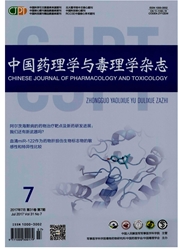

 中文摘要:
中文摘要:
采用一种灵敏,准确,简便的致突变研究方法,收集ig阿司匹林(Asp)对乙酰氨基酚(Par)及布洛芬(Ibu)的妊娠d 4大鼠胚泡进行微核试验,结果表明,孕后d3给Asp为微核产生高峰期;Asp】0.5g·kg-1,Par】0.25g·kg-1时呈显著的胚泡微核诱导作用,而Ibu0.5g·kg-1则无此效应,Asp各组微核呈依剂量增加,三药对同体孕鼠骨髓均无显著微核诱导作用,结果提示Asp和Par具遗传毒性,并证实整体大鼠着床前胚泡对某些化学物质的染色体断裂作用较骨髓细胞更为敏感。
 英文摘要:
英文摘要:
To evaluate the genetic toxicity of analgesic-antipyretics and anti-inflammatory agents,a more sensitive,accurate and convenient mutagenic test method was applied.Rat blastocysts were collected in the afternoon of d 4 of gestation from the uterus of female rats treated with aspirin(Asp),paracetamol(Par)or ibuprofen(Ibu).Asp(>0.5 g·kg-1)and Par(>0.25 g·kg-)did show an inductive effect on the micronucleus,but Ibu(0.5 g·kg-1)did not.The peak of the micronucleus frequency of Asp was in the d 3 treatment group.The micronucleusfrequency was dose-dependent when 0.25,0.5 or 1.0 g·kg-1 of Asp was administered.No significant increase of micronuclei induced by these drugs could be seen in the maternal bone marrow cells in the same rat.These results demonstrate the potential genetic toxicity of Asp and Par,and also confirm the sensitivity of the rat preimplanted blastocysts to clastogenic effect of some chemicals after in vivo exposure.
 同期刊论文项目
同期刊论文项目
 同项目期刊论文
同项目期刊论文
 期刊信息
期刊信息
